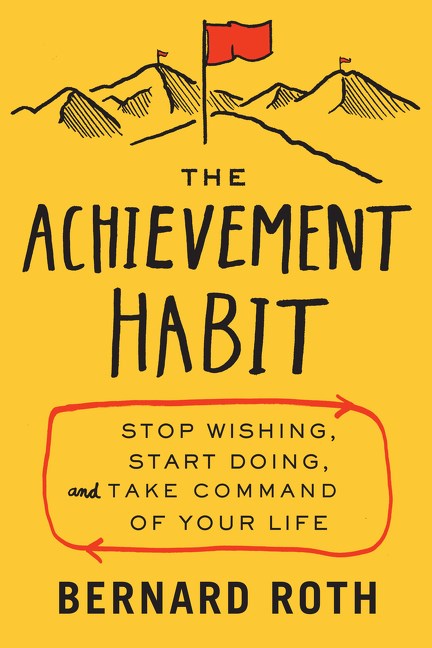The Achievement Habit: Stop Wishing, Start Doing, and Take Command of Your Life
July 09, 2015
In his new book, Bernard Roth, a professor of engineering and academic director at Stanford's famous d. school, teaches us how to engineer a better life.

The Achievement Habit: Stop Wishing, Start Doing, and Take Command of Your Life by Bernard Roth, HarperBusiness, 288 pages, $27.99, Hardcover, July 2015, ISBN 9780062356109
The Hasso Plattner Institute of Design at Stanford has become somewhat legendary. Commonly referred to as the d.school, it is know for a multidisciplinary approach to education that brings students and faculty from many departments together to “foster creativity, innovation, and collaboration” and solve real-world probems.
Perhaps the most famous member of the faculty is David Kelley, who you may know as the founder of IDEO and the man that brought “design thinking” to business. But, right along side him in the creation of that concept was Bernard Roth, professor of engineering at Stanford for fifty-two years, and one of the founders of the d. school. He has been teaching his popular “Designer in Society” class since 1969 and has conducted workshops all over the world based on the concepts in it. He has now taken what he teaches and turned it into a wonderful book, The Achievement Habit: Stop Wishing, Start Doing, and Take Command of Your Life.
Where other books and teachers have taken the concept of design thinking and applied it to solving problems in product and service design, or improving organizational processes in business, government, education, and the non-profit sector, Roth teaches us how to use it personally to design the life we want, to get out of our own way and just do.
This bias toward action is something he has been teaching in his classes since before he even knew that what he was doing was design thinking—or at least before the term existed.
At the heart of the course is a self-selected project: students must either do something they have always wanted to do but never done, or handle something that is a problem in their lives. I am available to discuss their choices [but] ultimately they decide what projects to work on. I don’t decide whether they’re good enough or big enough, and I don’t grade on anything other that whether they do what they set out to do. If they finish, they pass. If they don’t, the don’t get credit.
This teaches more than a bias toward action, though. The process of making the decision (students have done everything from jump out of an airplane to write a novel) teaches them to be deep-down honest with themselves about what they really want to do, even if that thing is scary, as it so often is to admit what we really want in life and take hold of it. The key is to reflect on, and know yourself well enough, to know what that thing actually is:
The more self-aware you can become, the happier you can be; by better understanding your motivations and identity, you can figure out how to design your life to be more satisfying and fulfilling.
This is a journey he takes the reader on in the book. The design thinking process requires you to empathize, define the problem, ideate, prototype, test and get feedback. But the most important part of that process is in the action, in the “doing rather than overthinking.” After all, as the old adage goes, “you don’t know until you try.” I think Roth would actually go a bit further, and say “you don’t know until you do.” Because, as he says, “trying is not good enough” and “excuses, even legitimate ones, are self-defeating.” All that matters is achieving what you want to get done, and just like procrastination, negativity, or making excuses, it becomes a habit.
Achievement can be learned. It is a muscle, and once you learn to flex it, there’s no end to what you can accomplish in life.
I have a running joke with my wife when she asks me to do something that basically boils down to me replying “I’m a grown man; I do what I want.” Of course, I say this because I’m about to do exactly what she just told me to do, but there is something in that joke that speaks to what we all need to do as grown people, as adults—quite simply, choose what we want to do, ignore distractions and temporary setbacks, and get things done. It needs to become self-reinforcing, and The Achievement Habit will show you how to make it so.
Bernard Roth, a professor of engineering, effectively teaches us how to engineer a better life. Rather than try and try again, which we’re all taught to do as children, he teaches us to do and do again, to stop making excuses, to “change our self-image into one of a doer” and make achievement a habit.


